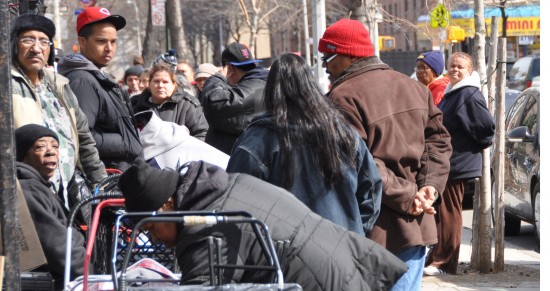
Mott Haven food pantry may be next
The soup kitchen run by the St. Benedict the Moor Neighborhood Center on St. Anns Avenue closed in November, leaving as many as 7,000 patrons a month without a source of breakfasts and hot lunches.
Now, its landlord says the food pantry next door, which continues to provide dry goods and raw food, may also be forced to close, depriving the 100 to 200 families it helps each day of a source of food.
The non-profit Moor House Gardens Development Fund, which manages the five- story apartment building that houses St. Benedict’s storefront, can no longer afford to give the space away, as it has for the last 15 years, said Rev. Michael Thomas, chairman of the board of Moor House Gardens Development Fund Corporation.
“Unless they can pay rent, they will be closed,” he said.
The financial crunch comes at a time when more and more residents are unable to buy their own food. Nearly a third of residents in the 16th Congressional District, which includes Mott Haven, Melrose and Port Morris, were unable to buy food at some point in the last year, according to the latest study by the Food Research and Action Center’s, released by the advocacy organization in March. That placed the 16th district with the highest “food hardship” rate in the United Sates.
“Any help you can get in the area of food means money to take care of other things,” said Elizabeth Porter, 44, a single mother of three and occasional pantry user. “At times, my household only has enough to pay the rent, and not enough to put food in the house,” said Porter, who also bears the responsibility of supporting her three grandchildren.
Since Thanksgiving, St. Benedict’s has had no electricity to power the fridge at the back of the food pantry. In January, the electricity in the freezer space at the defunct soup kitchen was cut off–a move that also affected the pantry, which can no longer store frozen food. Fresh meat that arrives at the pantry each day is distributed immediately.
The pantry doesn’t worry about food going to waste. It distributes every morsel to the people who wait daily in a line that stretches down St. Ann’s Avenue to the end of the block.
“I try to come here every day to see what they give. If they are giving anything that I like, I come and get it. It helps me a lot,” said Carmen Martine, 60, who is on a fixed income, and lives nearby at Millbrook Houses on East 137th Street. To say thank you, she has helped St Benedict’s prepare its annual Thanksgiving dinners.
St Benedicts has daily food distributions every morning that are available to anyone who queues outside. This is separate from the regular twice-monthly food collections that pantry clients must register for. Wednesdays and Thursdays mornings are the busiest days for the pantry, which receives fresh produce from City Harvest, a citywide food distribution organization that delivers fresh vegetables and fruits free of charge to emergency food operations.
“A lot of the people that line up are also clients of the pantry, so it’s a lot of repeat,” said Gains.
Anthony Jordon, executive director of the St. Benedict the Moor Neighborhood Center estimates that 100 to 200 families are served on City Harvest drop-off days.
The food pantry caters to more people, around 12 500 customers a month, than the soup kitchen. However, it can only help those who have a place to cook, said. “Most of our people are the street homeless,” he said, living in shelters with no cooking facilities.
“It kills me because too many hungry people come by and want something to eat, and can’t get it” said Denise Williams, head of St. Benedict’s soup kitchen and food pantry.
The homeless who frequent the pantry still come each day. Williams tries not to turn anyone hungry away, giving them “little things that you can open up and can eat,” such as canned ravioli, canned fruit, juice or small containers of milk and cereal.
She said homeless people ask her when the soup kitchen will resume operation. “It hurts me to tell them that I don’t know.”
“This pantry is a vital part of the community,” said Clothilda Gains, 55, who initially volunteered at St. Benedicts to fulfill her work assignment with an employment program that serves individuals with disabilities who receive public assistance. Even though it’s been two and a half years since her work requirement ended, Gains continues to work five days a week at the pantry.
“Everybody needs it. I need it. It’s my way of giving back,” she said.
Jordon said St. Benedicts is in talks with the development fund, and he hoped something could be worked out that would allow the St. Benedicts to stay. Meanwhile, he is also scouting other locations.
Thomas, the chairman of the development fund, said his organization was in debt to the city Department of Housing Preservation and Development, which runs the program under which Moor House Gardens manages the city-owned building. The city requires the building to become self-sustaining.
“The reason the soup kitchen needs to close is that we don’t have money and we are not generating money,” he said.

That is too bad that these kitchens are closing. I volunteer when I get a chance at a soup kitchen that is run by a christian church . It is always a really humbling experience for me. It helps me to be grateful for what I have, and also allows me to put other people’s needs above my own.